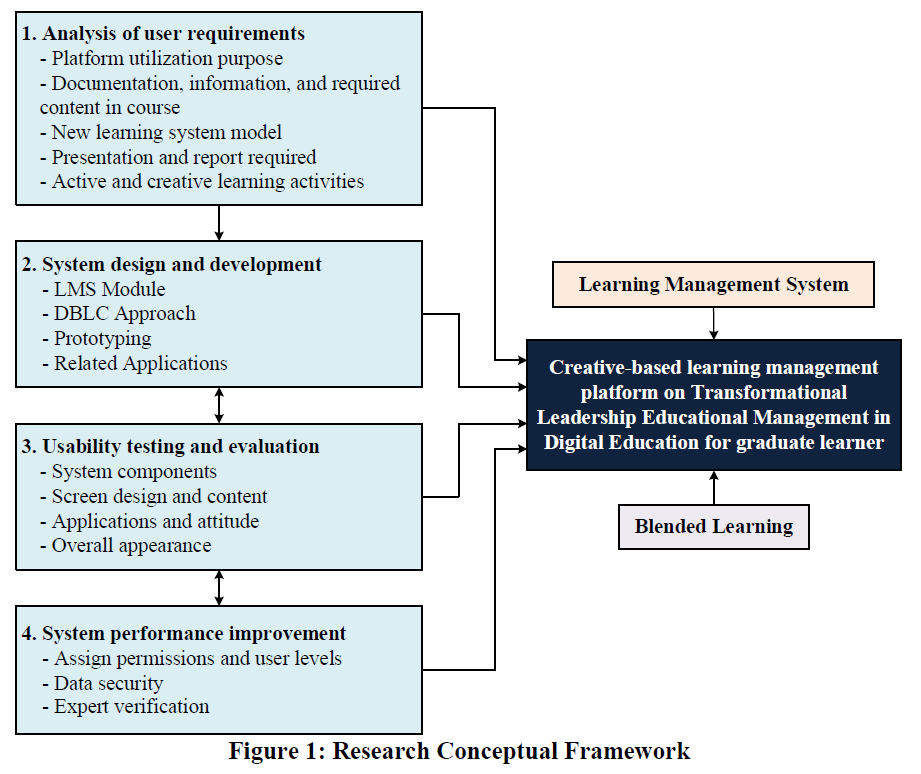Development of Creative-Based Learning Management Platform on Transformational Leadership Educational Management in Digital Education for Graduate Learner
Main Article Content
Abstract
The objectives of this research were to 1) design and create, test, use and evaluate a prototype of creative-based learning management platform on Transformational Leadership Educational Management in Digital Education for graduate learner; and 2) propose a creative-based learning management platform developed. This research is research and development. The sample group consisted of 38 graduate students in the master and doctoral of education program at the Rajamangala University of Technology Rattanakosin in the academic year 2024. The target group is fifteen experts in ICT systems and educational innovations. The research method consisted of four steps: 1) analysis of user requirement, 2) system design and development, 3) usability testing and evaluation, and 4) improving system performance. Quantitative data analysis by using statistical packages to show mean and standard deviation. The qualitative data analysis was used content analysis. The research results were as follows: 1) the prototype of a platform developed uses a DBLC development process. Experimenting with the operational system for graduate learning involves learning alongside technology with a simple implementation. Students have the highest level of satisfaction with the platform prototype that is evolving, and 2) this platform has a structure that consists of a website, lecturer and student database, knowledge record, knowledge assessment, discussion board, download documents, related case studies, and pictures of various activities. In addition, the prototype platform will provide students with practical skills in learning Transformational Leadership Educational Management in Digital Education, including better developing skills in the use of ICT systems in education.
Article Details

This work is licensed under a Creative Commons Attribution-NonCommercial-NoDerivatives 4.0 International License.
References
Asad, M.M., Hussain, N., Wadho, M., Khand, Z.H., & Churi, P.P. (2021). Integration of e-learning technologies for interactive teaching and learning process: an empirical study on higher education institutes of Pakistan. Journal of Applied Research in Higher Education, 13(3), 649-663.
Buasuwan, P. (2018). Rethinking Thai higher education for Thailand 4.0. Asian Education and Development Studies, 7(2), 157-173.
Demir, A., Maroof, L., Sabbah Khan, N.U. & Ali, B.J. (2021). The role of e-service quality in shaping online meeting platforms: A case study from higher education sector. Journal of Applied Research in Higher Education, 2021, 13(5), 1436-1463.
Gabaree, L., Rodeghiero, C., Presicce, C., Rusk, N., & Jain, R. (2020). Designing creative and connected online learning experiences. Information and Learning Sciences, 121(7/8), 655-663.
Garbin, F.G.d.B., Ten Caten, C.S., & Jesus Pacheco, D.A.d. (2022). A capability maturity model for assessment of active learning in higher education. Journal of Applied Research in Higher Education, 14(1), 295-316.
Gioiosa, M.E., & Kinkela, K. (2022). Assessing the outcomes of an active learning exercise. Journal of Applied Research in Higher Education, 14(4), 1496-1508.
Hamdan, K.M., Al-Bashaireh, A.M., Zahran, Z., Al-Daghestani, A., AL-Habashneh, S., & Shaheen, A.M. (2021). University students’ interaction, internet self-Efficacy, self-regulation and satisfaction with online education during pandemic crisis of COVID-19 (SARS-CoV-2). International Journal of Educational Management, 35(3), 713-725.
Huang, X., & Lai, C. (2020). Connecting formal and informal workplace learning with teacher proactivity: a proactive motivation perspective. Journal of Workplace Learning, 32(6), 437-456.
Ismaili, Y. (2021). Evaluation of students’ attitude toward distance learning during the pandemic (Covid-19), A case study of ELTE university. On the Horizon, 29(1), 17-30.
Kant, N., Prasad, K.D., & Anjali, K. (2021). Selecting an appropriate learning management system in open and distance learning: a strategic approach. Asian Association of Open Universities Journal, 16(1), 79-97.
Kim, J., Beyerlein, M., Wang, J., & Han, S.J. (2023). Building a nomological network for creative learning transfer focusing on leadership development. Leadership & Organization Development Journal, 44(5), 643-656.
Kayes, D.C., Wirtz, P.W., & Burgi-Tian, J. (2024). Overcoming unpleasant affective experiences while learning: latent profiles of resilience while learning. Journal of Management Development, 43(1), 103-123.
Laudon, K.C. & Laudon, J.P. (2019). Management Information Systems. (15th ed.). New York: Pearson Education Indochina.
Lyapina, I., Sotnikova, E., Lebedeva, O., Makarova, T. & Skvortsova, N. (2019). Smart technologies: perspectives of usage in higher education. International Journal of Educational Management, 33(3), 454-461.


